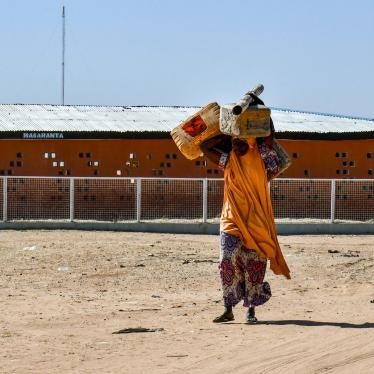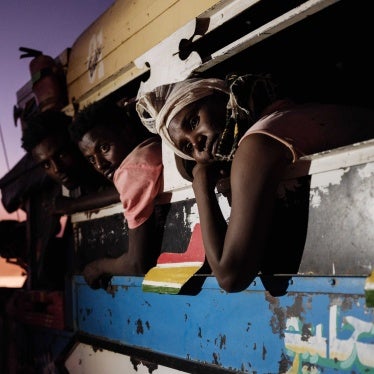(Goma) - More than 100,000 displaced civilians in Lubero territory in eastern Democratic Republic of Congo desperately need protection from further attacks by Rwandan militias and Congolese forces, Human Rights Watch said today. Human Rights Watch called on the United Nations peacekeeping force and humanitarian agencies to take urgent steps to increase protection and assistance to the civilians at risk.
In mid-January 2009, Congolese government forces - initially supported by Rwandan Defense Forces and later by the UN peacekeeping force, MONUC - carried out military operations against two Rwandan militia groups, the Democratic Forces for the Liberation of Rwanda (FDLR) and the Rally for Unity and Democracy (RUD). According to the UN, recent fighting has forced more than 100,000 people from their homes in Lubero territory, North Kivu province, as they tried to flee rapidly shifting front lines, bringing to 250,000 the number of those who have fled since January.
"Civilians fleeing for their lives are stuck between a rock and a hard place, and are unsure where they can find safety," said Anneke Van Woudenberg, senior Africa researcher at Human Rights Watch. "They urgently need protection and humanitarian assistance, but there are too few peacekeepers and UN agencies to help them."
Many have sought shelter in the villages and towns of Luofo, Kayna, Kirumba, Kanyabayonga, and Kasegbe, in Lubero territory, some of which were later attacked by the Rwandan militias. According to information collected by Human Rights Watch researchers in Lubero, at least 35 civilians have been killed, 91 women and girls raped, and hundreds of homes burned to the ground since the operations began. Both Rwandan fighters and Congolese army soldiers are responsible for the abuses, with each accusing civilians of supporting the other side. Promised additional UN peacekeeping forces have not yet arrived.
In an attack on April 17, five children were burned to death when Rwandan militias attacked Luofo village, where more than 12,000 displaced people had sought shelter. The attack appeared to be a reprisal against the population in response to the government's military operations. Local authorities said that two days after the attack they received a letter from one RUD militia commander stating that the people of Luofo would "continue to be burned and buried."
Similar reprisal killings by the other Rwandan militia, the FDLR, have been documented by Human Rights Watch in areas of North and South Kivu. Human Rights Watch repeated its call on the Rwandan militias to stop immediately its deliberate attacks on civilians, which constitute war crimes.
The attack on Luofo came only five days after the UN peacekeeping force withdrew its temporary operating base from the village following the arrival of Congolese army soldiers. With peacekeeping troops stretched sparsely across eastern Congo, UN officials said their presence was more urgently needed in other towns.
The UN has fewer than 400 peacekeepers in Lubero territory, in two bases at Kanyabayonga and Lubero, plus two recently established temporary bases at Luofo and Kirumba. Rwandan militias have threatened to attack next the neighboring towns of Kirumba and Kayna, which harbor over 35,000 displaced people.
The 3,000 additional peacekeepers authorized by the UN Security Council in November 2008 have still not arrived in eastern Congo, despite promises from council members that they would urge a rapid deployment. Helicopters and intelligence support, desperately needed by the mission, have also not materialized. On April 9 in New York, Alan Doss, the head of the UN peacekeeping force, warned the Security Council that, without such assets, MONUC's "capacity to respond quickly to emerging threats and protect civilians would be curtailed."
"UN Security Council members gave MONUC a strong mandate to protect civilians, but not the means to do so," said Van Woudenberg. "They should immediately provide the support they promised."
Congolese government soldiers responsible for protecting their citizens have themselves been involved in many of the abuses. Of the 91 women and girls known to have been victims of sexual violence in recent months, at least 56 reported they were raped by government soldiers, who often accused their victims of being the wives of FDLR combatants. Government troops, ill-disciplined and unpaid, have burned and pillaged hundreds of homes, arbitrarily arrested civilians, stolen their crops, and looted their property.
UN peacekeepers are involved in the joint military operations with Congolese government forces against Rwandan militias in what is known as Operation Kimia II. But peacekeepers have so far been unsuccessful in restraining government soldiers from committing abuses against civilians.
"Congolese authorities need to discipline abusive soldiers to bring the rape and looting to a halt," said Van Woudenberg. "UN officials should be clear that its peacekeepers cannot support military operations where Congolese soldiers are committing abuses against civilians."
Tens of thousands of people displaced from their homes are struggling to survive. Unable to harvest their crops, they are continually hungry and dependent on the limited help provided by already-overburdened host families. Few UN and humanitarian agencies are working in Lubero territory to provide the much-needed assistance, due to limited donor funds and lack of security to give them access to the people in need.
"More UN peacekeepers, improved protection, and increased humanitarian aid are desperately needed to help those at risk of further attacks in Lubero territory," said Van Woudenberg. "The cries of Congolese people in distress should not be ignored."






